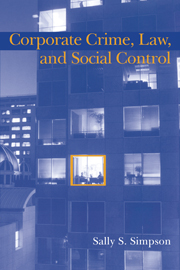Book contents
- Frontmatter
- Contents
- Preface
- 1 Criminalizing the Corporate Control Process
- 2 Deterrence in Review
- 3 Assessing the Failure of Corporate Deterrence and Criminal Justice
- 4 Corporate Deterrence and Civil Justice
- 5 Corporate Deterrence and Regulatory Justice
- 6 Cooperative Models of Corporate Compliance: Alternatives to Criminalization
- 7 Criminalization versus Cooperation: An Empirical Test
- 8 Shaping the Contours of Control
- Appendix A Study One: Questionnaire Items and Responses
- Appendix B Study One: Sample Characteristics
- Appendix C Study Two: Questionnaire Items and Responses
- Appendix D Study Two: Sample Characteristics
- Name Index
- Subject Index
4 - Corporate Deterrence and Civil Justice
Published online by Cambridge University Press: 10 December 2009
- Frontmatter
- Contents
- Preface
- 1 Criminalizing the Corporate Control Process
- 2 Deterrence in Review
- 3 Assessing the Failure of Corporate Deterrence and Criminal Justice
- 4 Corporate Deterrence and Civil Justice
- 5 Corporate Deterrence and Regulatory Justice
- 6 Cooperative Models of Corporate Compliance: Alternatives to Criminalization
- 7 Criminalization versus Cooperation: An Empirical Test
- 8 Shaping the Contours of Control
- Appendix A Study One: Questionnaire Items and Responses
- Appendix B Study One: Sample Characteristics
- Appendix C Study Two: Questionnaire Items and Responses
- Appendix D Study Two: Sample Characteristics
- Name Index
- Subject Index
Summary
because legal responses to corporate offending involve multiple systems of law, the potential for crime inhibition may also be embedded in these alternative formal justice systems. In this chapter, we investigate how corporations and corporate officers experience the civil justice process and, in doing so, assess whether and under what conditions civil law may yield deterrent effects. In discussing corporate deterrence and civil law, I review the primary assumptions, goals, and normative rules of civil justice; compare the substantive and procedural requirements for case development and processing in the civil and criminal legal systems; and assess the deterrence capacities of civil law and, in particular, punitive civil sanctions.
Civil law and corporate offending
Delineation of the legal duties of persons in relationship to one another comprises the body of civil law. In the United States, civil laws regulate family and business relations, contracts, and interpersonal disputes, among other relations. In the study of corporate crime, businesses primarily come into the domain of civil law in one of two ways. Victims of corporate crime may seek compensation for injury by filing a complaint, or “tort action,” in civil court. The so-called moving agent in these cases is the private citizen. Civil cases against corporations may also originate within the prosecutorial or administrative process as state or federal authorities (such as state attorneys general, the Department of Justice, the Environmental Protection Agency, or Securities and Exchange Commission) increasingly have the option of employing either civil or criminal means to pursue corporate violators.
- Type
- Chapter
- Information
- Corporate Crime, Law, and Social Control , pp. 61 - 78Publisher: Cambridge University PressPrint publication year: 2002



